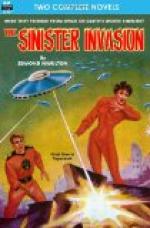Lockley tried to reason out why this nerve-wracking application of the terror beam hadn’t been used before. To an unprotected man it would be worse than continuous pain. No living man could remain able to resist any demand if exposed to such torture.
The beam was evidently swung at random intervals, and the phenomenon lasted for an hour and a half. Anyone but Lockley behind a cloud of ions would have been reduced to shivering hysteria. Then, suddenly, the beamings stopped. But Lockley left his device in operation.
Half an hour later still—close to five o’clock—it appeared that the invaders assumed that any enemy should have been softened up for capture. They sent an expedition to find out what had happened to their trucks and cars.
Lockley saw four cars and a light truck in close formation moving toward him from the Lake. They were close, as if for mutual protection. They moved steadily, as if inviting the fate that had overtaken others. The short wave reports from smashed trucks seemed improbable to them, but the expedition was equipped to investigate even such unlikely happenings.
The four cars in the lead contained five men each. Each man was armed with a rifle containing a single cartridge in its chamber and none in its magazine. The rifles pointed straight up. There was more ammunition in the light truck behind, and it was in clips ready for use, but the truck body was of iron. If that ammunition detonated, it could do no harm. If it did not, it would be available for use against the single man mentioned by the driver of the last truck to be wrecked.
But Lockley saw them coming. They came sedately down a long straight stretch of road. He climbed a rocky wall beside the highway to a little ravine that led away from the road. He posted himself where he was extremely unlikely to be seen. Then he waited.
The cavalcade of cars appeared. It drove briskly toward Lockley at something like thirty miles an hour. Perhaps ten yards separated the lead car from the second. The truck was a trifle closer to the four man-carrying vehicles. They swept along, every man alert. They would pass forty feet below Lockley.
He did nothing. His device was already turned on. He watched in detached calm.
The lead car stopped as if it had run into a brick wall, while rifles inside it blew holes in its top. The second car crashed into it, rifles detonating. The third car. The fourth. The truck piled into the others with a gigantic flare and furious report, each separate brass cartridge case exploding in the same instant. The truck became scrap iron.
Lockley went away along the small ravine. From now on he would avoid the highway. He estimated that he would arrive at Boulder Lake itself about half an hour after dark. It occurred to him that then Jill would have been a prisoner of the invaders for something more than twelve hours, at least ten of them at their headquarters.




